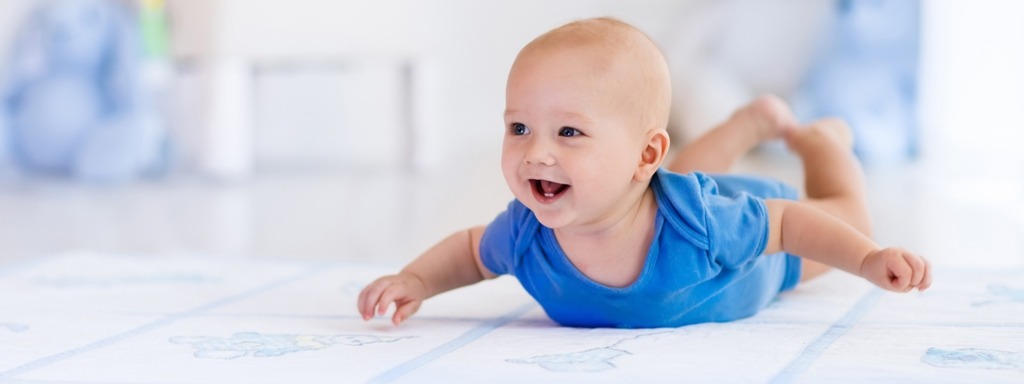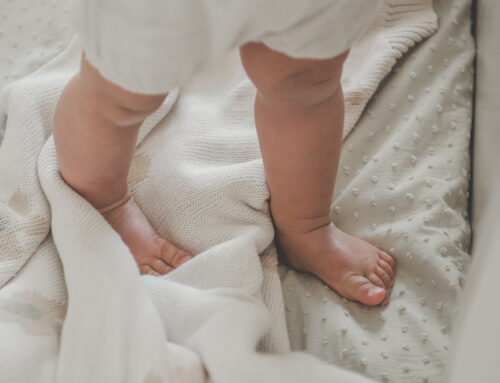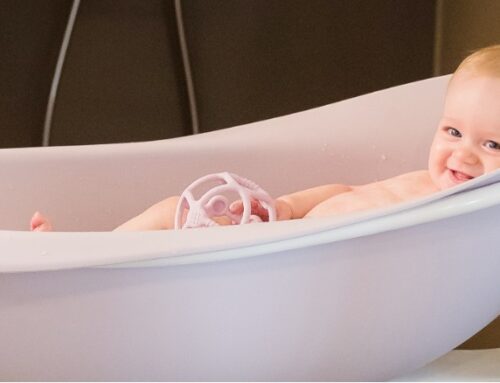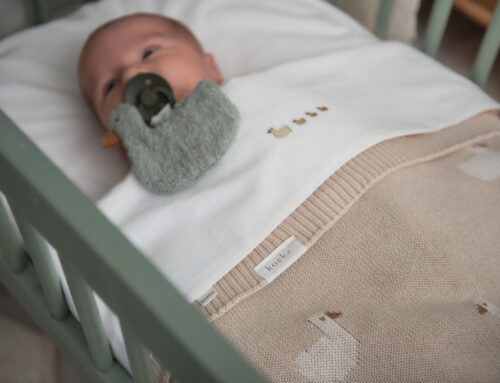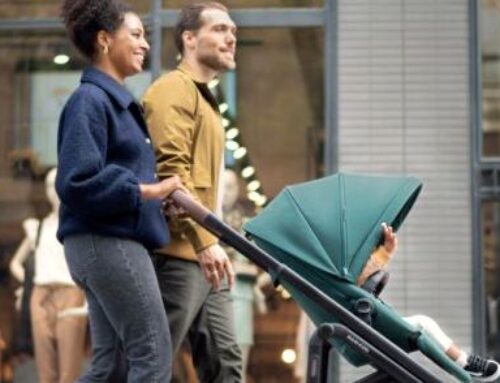Do babies move enough? What is the current situation and what could be done better at home and in childcare? In adults, the importance of exercise is clear: it ensures good health and has a positive influence on, for example, blood pressure and heart condition. In short: exercise is good for your health. In the case of small children, there is much more to it. By moving, a child exercises his musculature and becomes stronger and stronger, which is good for his self-confidence. But there’s something more: with movement a child also learns to discover his or her surroundings and his or her own body.
For this subject, we interviewed expert Marije Magito, director of the ‘Jonge Kind Centrum’ which organises various workshops for parents with themes such as ‘Sleeping’, ‘Playing with your baby and toddler’ and weekly activities such as the Baby Club, Toddler Fun and Toddler Steps. In addition, the Jonge Kind Centrum offers training programmes and workshops to professionals in childcare. We also asked Tineke van Westerop some questions. She is paediatric physiotherapist and expert in the motor development of children from 0 to 4 years of age.
How do things stand with the motor skills of babies and toddlers?
‘Babies don’t move enough, not enough attention is spend on this’, according to Marije. Baby clinics do keep a close eye on developmental delays and overweight, but parents are not so aware of this as to allow babies to move more and better. Parents need to learn to facilitate and support this, especially with babies. There are local workshops such as baby yoga, baby swimming, a Baby Club like the ones in Almere and Rotterdam and baby massage. Massage (touch) is more important than you think because it supports, among other things, the development of body awareness. Babies are born without any awareness of their body and this awareness grows as they get older and gain body experiences. Just think of the baby who discovers his hands for the first time. Then you see the amazement. By naming the experience, the baby begins to link words to those experiences and thus learns that his hand is his hand. During a massage, babies experience the sensation of touching their body and thus the awareness of their own parts of the body and therefore their musculoskeletal system. And you can only ‘control’ that musculoskeletal system properly if you know which part is suitable for what. This means that babies need to be able to practice a lot and they literally and figuratively need ‘space’ to do so.
If a baby is going to push himself forward on your lap by stretching its legs, he is just practising until he is strong enough to carry his own weight. Children must be given the opportunity to move and therefore learn. The Feldenkrais method assumes that babies discover themselves and the world around them on the basis of their experiences. In addition, there are the ‘SpeelRuimte bijeenkomsten’ [Playing Area meetings] according to the Emmi Pikler method, especially popular in the north and east of the country. Babies can play freely here and parents and supervisors can watch from the sidelines what their babies experience and learn’
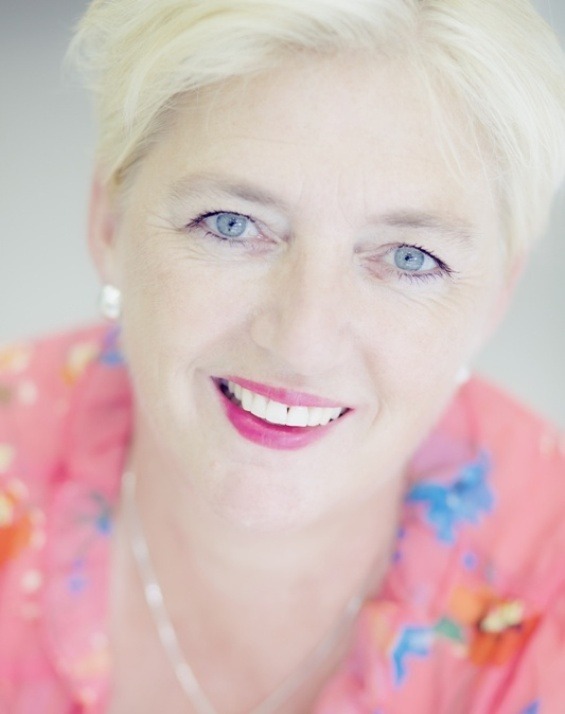
Marije Magito, general manager Jonge Kind Centrum
Parents are impatient
She continues: ‘Babies naturally have their own drive to move, as a parent you don’t have to do so much about that. Around 8 months of age, children will be able to sit on their own and then they will be strong enough. But parents would like their children to be able to sit and enjoy some cozy time at the table in the highchair a little earlier. Children will then be secured completely and producers will develop all kinds of things to meet the needs of parents. The fact that a child cannot sit down yet, has to do with the fact that his body is not yet strong enough for this. Instead of supporting him in this by ‘securing’ him to something, it is better to give a child more room to move so that he can strengthen his muscles.
Activities offered to a far younger age group
I also see that activities meant for ‘big children’ are being offered to a far younger age group. There are sports clubs where children from the age of 1.5 years can play football for toddlers. Fathers who used to play football themselves, for example, would like their son to play football as well. Preferably as soon as possible. Resulting in 30 toddlers walking around in a group going all directions except the right one. They are just too young for that, both physically and mentally. Grass does not grow any faster by pulling it either, children grow into it on their own. It would be nice if parents and organisations could be a little more patient. In addition, the musculoskeletal system is stressed far too much on one side. Starting this kind of activity too early is not a good thing, and there is a good chance that parents will overcharge their young children and allow them to have negative experiences in something they want so badly. And this surely cannot be the intention.’
Do parents not know how to handle a baby?
‘Absolutely!’, Marije replies. There are many parents who do not know what a baby needs in order to develop properly. This is determined by a demographic history. The first baby held by young parents is often their own, whereas we used to babysit small children on a regular basis ourselves. Families used to be bigger, so there were always siblings to look after. And the mutual ties in the community where people lived were stronger. Now families live more apart, because you travel everywhere by car, with the result that families become isolated. At the Baby Club, we see parents coming in who do not know what else to offer a baby other than food, a clean nappy, cuddles and toys. It is also difficult to imagine what the life of parents is like now without help and with all the technology currently present’.
What about making toys available?
Children are now lying in the playpen with so many toys and cuddles that they can hardly move. They look at a babygym and above it hangs another mobile, they experience sensory overload and will not be able to play anymore. Babies get fixated, cannot filter so they will not let go of this image. The problem is also that parents do not know what all these toys now mean for their child’s development. When parents join us at the Baby Club, we offer them a bowl and a ball and tell the parents: take a good look at what your child is going to try out himself. Then you will see that children discover a tray completely with their hands and mouth, put the ball in and discover that the ball can be thrown out. This way, parents learn what their child is learning. There are many beautiful toys available, but parents have no idea what exactly children learn with them. Manufacturers should be able to explain that much more clearly’.
Marije herself is a big fan of balls in all sizes, especially beach balls. ‘They are light and very instructive; if you push it, it rolls away; if you push harder, it rolls further away. They get to know the shape, the weight, the material, they just engage in arithmetic! You can roll balls, throw them, you can sit on them, you can do massage and balance exercises on beach balls so that children can train their muscles’.
Is there enough information available for parents?
‘I sometimes see parents who really don’t know how to pick up their child and what to do with their child. Parents no longer know where to get information for the care of their child. There are so many parenting questions. They read too little and sometimes too much. In addition, they often mirror themselves to role models on social media and this does not always make them happy. And this also includes highly educated parents. The problem is much bigger than we think’.
She gives an example. Parents no longer know how to teach their little one how to climb and don’t want to, afraid of falling and bruising. These are all risk-averse behaviours for which they can now buy baby helmets, knee and elbow pads and even a pillow-shaped backpack online. We have a layer of pyramid-shaped wooden furniture with a gangway. Instead of teaching the child to climb and clamber barefoot so that it learns to assess risks for itself, they hold the child by the hand and want the child to walk up on a slippery board with socks on. That does not work, of course.
What about childcare expertise?
Marije: In 2018 the law IKK came into force. This stipulates that only 3 babies are allowed to be under the supervision of a baby carer, that a mentor must be present to better monitor children’s development and there is compulsory further training for the carers working with babies. But that has made baby groups unaffordable. For practical and financial reasons, they are placed in vertical groups of 0 to 4 years and that’s a mistake. After all, babies cannot be placed on the ground between racing bicycles and there is often insufficient space for playpens on the ground, with the result that they are all too often placed safely in high playpens. Research data of the ‘Landelijke Kwaliteitsmonitor Kinderopvang’ (National Child daycare Quality Monitor) from 2018 show that the educational quality in the vertical groups for babies is lower than in a (horizontal) baby group. With the introduction of the Child daycare (Innovation and Quality) Act (IKK Act), there have only been more vertical groups. The big question is what this means for the educational quality of babies. Crowds in the group can cause babies to experience sensory overload and stress, but with the new act the risk of understimulation lurks because they receive less attention and care, especially if they are quiet babies. In doing so, the IKK Act is counterproductive’.
Ten years ago we interviewed paediatric physiotherapist Tineke van Westerop on the subject of babies and exercise. She expressed her concern about the many small children being stuck in bouncers, lounge chairs, child safety seats and highchairs, but also in strollers and buggies and the consequences for small children.
What is the current situation, do babies move enough?
According to Tineke, we have to distinguish between childcare and the home situation. In childcare, more attention has definitely been paid to dealing with babies. Employees are more aware that babies need room to move, but in practice this is difficult due to time pressure. An example: educational assistants are busy and for practical reasons they feed the babies while they are in a bouncer. Sometimes two or three in a row, that saves time. In order to prevent reflux, they let the babies digest their food comfortably in a bouncer for a while, while carrying out other tasks. Before you know it, the babies have to go back to bed or have fallen asleep in the chair without being able to move freely for a while. Educational assistants do want to organize things differently in the group, but they run into that time pressure’.
Has there been any change in the home situation?
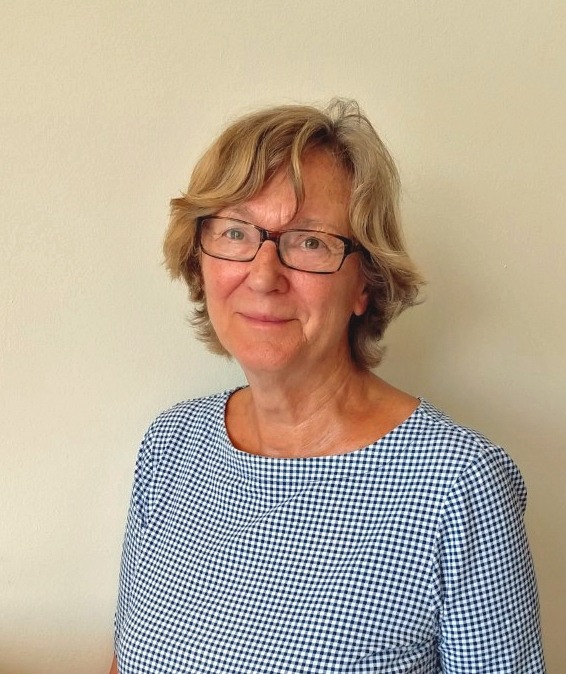
Tineke van Westerop, paediatric physiotherapist
‘At home with the parents, little has changed in my opinion. It is certainly not unwillingness, but there is little knowledge of motor development. In any case, in today’s society there is much more interest in children’s cognitive development than in motor development. Also from the side of the government. Some children only get 1 hour of physical education per week in primary school, nothing has improved in recent years. Exercise physiologists see teenagers who don’t even know that their heart will beat faster when they start to exercise. Orthopeadic surgeons such as Piet van Loon have been working hard for years for more prevention, because they are worried about all those children with back problems… What’s more, all the fun of old-fashioned television is now available 24/7 on mobile devices via the Internet. You could not wish for a nicer sop. In short, from birth, children sit in a bent position for many hours. The back muscles are used far too little. This will certainly have consequences such as various musculoskeletal complaints at an increasingly younger age’.
A bouncer is handy, isn’t it?
Tineke: ‘Parents are convinced they can’t do without a bouncer and buy too much stuff for their baby anyway. While a baby’s real needs are very basic; love, attention and being able to eat and sleep at set times. If babies can rely on this, they will be able to develop optimally without our help’. She’s continues: It would care a lot if the children, including the babies, were lying on their stomachs while looking at the phone or tablet. In this way they train the back muscles and strong back muscles will give you pleasure for a lifetime. Put the baby in the playpen rather than in a bouncer, because the more exercise experience a baby is allowed to gain, the better it is for brain development!’


